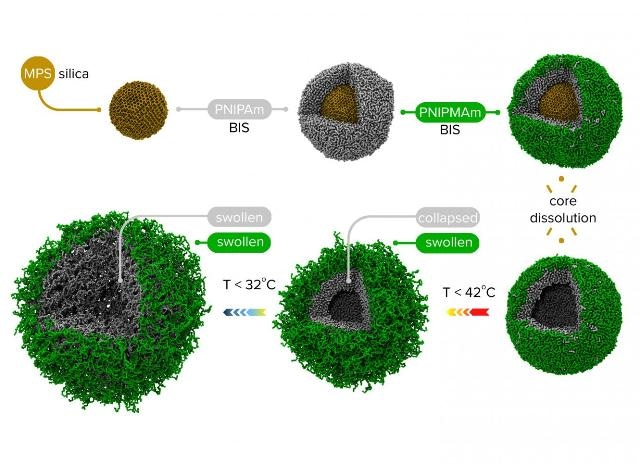May 5 2016
While the study is purely fundamental, Igor Potemkin, Professor of the Chair of Polymer and Crystal Physics, Physics Department, the Lomonosov Moscow State University, claims that the development of specialized nano-capsules for targeted drug delivery can be achieved only on the basis of the system reported in recent years, and that the development of such nano-capsules would also be inexpensive.
 A method of manufacturing of containers and their nano-structure depending on the temperature. (Credit: Igor Potemkin/Scientific Reports)
A method of manufacturing of containers and their nano-structure depending on the temperature. (Credit: Igor Potemkin/Scientific Reports)
For a long period of time, researchers have been studying prospective drug delivery systems. Given the huge potential of this approach, a number of labs across the globe are working on their creations. While plenty of nano-carriages for targeted drug delivery have been developed, researchers are still facing several problems; the key among these is to ensure that the medicine does not act until it reaches the targeted site in the body.
Many existing carriers encapsulate drugs through the long-range electrostatic interactions -- the carrier attracts oppositely charged medicine. Our method does not deal with the electrostatics at all. Filling in the nanogel by the guest molecules, locking them in the cavity and further release are controlled by the temperature. Therefore, the medicines themselves can be both charged and neutral.
Professor Igor Potemkin, Physics Department, Lomonosoc Moscow State University
The authors argued that while other tools are available to activate the release of drugs - such as a pH and an external magnetic field - in each case, scientists always faced efficiency issues when it came to drug release. The researchers went on to utilize the gel nano-capsules, which were not considered potential carrier systems. The key challenge that limited the interest in these systems was that the capsules tend to stick with the adjacent capsules (lost colloidal stability) when attempting to deliver drugs. This type of behavior made the delivery process ineffective.
To resolve this issue, the scientists produced a carrier with an interior cavity that resembles an egg with two shells, is enclosed by two membranes of diverse chemical structures. The exterior porous shell plays a stabilizing or protective role and prevents the clumping of the nano-capsules, conversley the pores of the internal shell close and open based on the temperature and also due to the inconsistent interactions between its monomeric units.
During the time of filling, the pores of both these shells remain open, and the drug molecules are absorbed by nanogel as a sponge. When there is a change in temperature, the pores of the inner shell close and remain locked inside the cavity, finally releasing the drug. These pores will then reopen and the guest molecules will be delivered to only those sites where the temperature allows. The design of the nanogel was limited to the production of two nanogel shells of varied chemical structures over the silica core. Towards the end of the production, the core was dissolved chemically, leaving just the cavity or "empty space".
The scientific partnership will be extended for another four years.
There are still many questions. For example, we have "caught" a structure in which a cavity does not collapse as the pores are closed. Now we need to understand why it happens, how does the density of the layers' crosslink effect, i.e., what is the minimum amount of crosslinker that does not lead to a collapse of the cavity, and so on.
Professor Igor Potemkin, Physics Department, Lomonosoc Moscow State University
According to Potemkin, the nano-containers are the perfect carriers for targeted drug delivery, along with the fact that their synthesis is also simple and cost-effective. While it is rather difficult to pronounce the actual cost at this point of research, the collaboration team has already planned to include the creation of commercially acceptable, large-scale synthesis of nanogels.